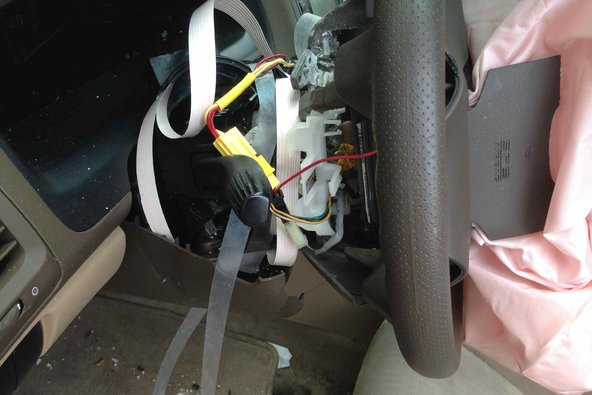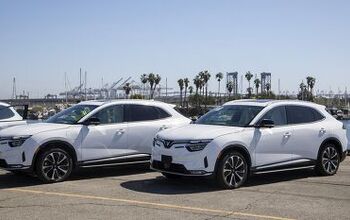Ignition Switches, Gas Pedals, Emissions Cheating & Exploding Airbags. Which is Most Scandalous?

I wouldn’t be surprised if every morning in Tokyo executives at Takata hope that more revelations come out concerning Volkswagen’s diesel emissions cheating scandal so as to push any revelations about their own exploding airbag scandal down the page.
Last week, Honda accused Takata of “misrepresented and manipulated test data” in explaining why they decided to stop using Takata as a supplier.
On Monday, the Wall Street Journal, based on internal documents discovered as a result of lawsuits, reported that Takata engineers in the United States had expressed reservations about fudged test results going to Honda starting in 2000.
Defective airbags made by Takata have been associated with over 100 injuries and eight deaths. The propellant Takata currently uses can be unstable if not handled properly and inflators have exploded, sending shrapnel into drivers and passengers. More than 19 million vehicles have been recalled just in the U.S. with millions more around the globe.
The Takata memos indicate that its engineers in the U.S. had expressing concerns that their colleagues in the home office in Japan were both altering results and burying failures from validation tests. One memo from a U.S.-based Takata engineer talked of “prettying up” data that went contrary to the results of his own team, saying that the manipulation “has gone beyond all reasonable bounds and now most likely constitutes fraud.”
Takata offered multiple explanations, saying that the internal memos the Journal exposed either don’t have anything to do with their exploding airbags, related to a problem with the airbag inflator that was resolved, or related to airbag inflators that never reached production. Takata did tell the WSJ that there was indeed situations where customer validation reports had included, “selective, incomplete or inaccurate data.” They apologized, blaming the problem on employees trying to meet production deadlines.
In recent years, there have been four big recall related scandals in the automotive industry: Toyota’s alleged unintended acceleration problem; General Motors’ ignition switches that shut off cars, resulting in collisions bereft of airbag protection; Volkswagen’s diesels that ran special software when being emissions tested; and, the exploding Takata airbags. All involve either risk to consumers or potential harm to the environment with attendant health issues. It seems to me that of the four scandals, the Takata airbag matter has, if not quite gone under the radar, gotten relatively less attention from consumers and the general public. Maybe that’s because the other three involve big, famous car companies rather than a relatively obscure supplier.
That seems peculiar to me in light of the fact that the Takata issue affects so many more car owners, affecting cars from a variety of manufacturers. Add the fact that it involves explosions and shrapnel, sure to get people’s attention. I have no personal taste for gore, but recognize that it generates publicity. In choosing a photo to illustrate this post, I opted not to use photos of blood spattered airbags I was able to find at law firms’ websites. Despite the potential for publicity, though, both car enthusiasts and the general public seem to be going “meh” at the Takata airbag story.
How would you rank the recent automotive scandals in terms of importance, possible harm to the public and consumers, and self-inflicted harm to the companies involved?
Photo credit: NHTSA
Ronnie Schreiber edits Cars In Depth, a realistic perspective on cars & car culture and the original 3D car site. If you found this post worthwhile, you can get a parallax view at Cars In Depth. If the 3D thing freaks you out, don’t worry, all the photo and video players in use at the site have mono options. Thanks for reading – RJS

Ronnie Schreiber edits Cars In Depth, the original 3D car site.
More by Ronnie Schreiber
Latest Car Reviews
Read moreLatest Product Reviews
Read moreRecent Comments
- Varezhka Maybe the volume was not big enough to really matter anyways, but losing a “passenger car” for a mostly “light truck” line-up should help Subaru with their CAFE numbers too.
- Varezhka For this category my car of choice would be the CX-50. But between the two cars listed I’d select the RAV4 over CR-V. I’ve always preferred NA over small turbos and for hybrids THS’ longer history shows in its refinement.
- AZFelix I would suggest a variation on the 'fcuk, marry, kill' game using 'track, buy, lease' with three similar automotive selections.
- Formula m For the gas versions I like the Honda CRV. Haven’t driven the hybrids yet.
- SCE to AUX All that lift makes for an easy rollover of your $70k truck.


































Comments
Join the conversation
My rankings of these scandals are as follows: 1. Takata - Airbags are a passive system that operate without any input from the driver. That means that I cannot have an impact on their operation (other than avoiding a crash.) The fact that the propellant is unstable and moisture makes it more unstable in my opinion makes this worse than the others. There is no way that a chemist or engineer would NOT know that fact. 2. GM ignition switches - a sudden loss of power makes controlling the vehicle incredibly difficult. GM's penny pinching along with consequences of a failure put this at #2 for me. Cover up also makes it more serious. 3. VW - deliberate cheating to make a profit. That alone is serious. The health and environmental aspects are open to debate therefor I don't score this one any higher. Disease and death D/T pollution can be extrapolated but direct links to these cars would be impossible to assess accurately. 4. Toyota UA - that one from my perspective is serious but the problem is amplified by driver's making incredibly poor decisions. I don't know of an automatic transmission that isn't easy to pop into neutral. My take on this one was that Toyota was culpable due to a very sluggish top down bureaucratic response to the issue.
MANY OF YOU will pay the ultimate price for not buying an SRT product.